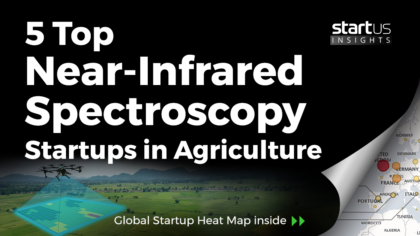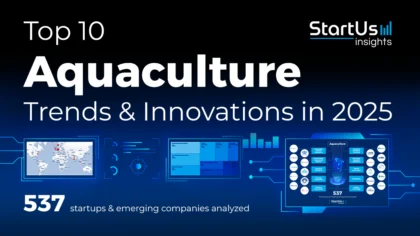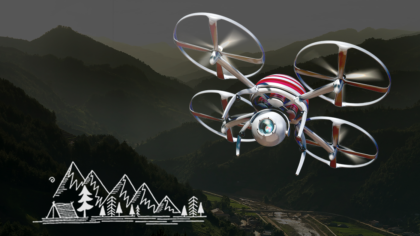Accelerate Productivity in 2025
Reignite Growth Despite the Global Slowdown
Our Innovation Analysts recently looked into emerging technologies and up-and-coming startups working on solutions for the agriculture sector. As there is a large number of startups working on a wide variety of solutions, we want to share our insights with you. This time, we are taking a look at 5 promising near-infrared spectroscopy startups.
Heat Map: 5 Top Near-Infrared Spectroscopy Startups
For our 5 top picks, we used a data-driven startup scouting approach to identify the most relevant solutions globally. The Global Startup Heat Map below highlights 5 interesting examples out of 309 relevant solutions. Depending on your specific needs, your top picks might look entirely different.
ChrysaLabs – Soil Mapping
Soil nutrients and health are a major influence on crop yield. Monitoring real-time soil data allows agronomists to create soil maps. These enable the precise application of fertilizers to supplement soil nutrients. However, creating soil maps is expensive and time-consuming as it involves digging at regular intervals, followed by chemical testing.
The Canadian startup ChrysaLabs manufactures a portable spectroscopic probe that maps soil samples in real-time. Their patented interface combines near-infrared spectroscopy with artificial intelligence (AI) to quickly measure soil nutrients, pH, moisture, and organic matter. The geotagged test results instantaneously create fertilization maps.
Fotenix – Crop Analytics
Farmers and agronomists traditionally rely on visual or chemical inspection to check for signs of stress or disease in crops. While visual inspection isn’t very informative, chemical inspection involves significant effort and time. However, spectroscopy-based methods depend on the interaction of light at particular wavelengths with matter and are both highly informative and yield rapid results. They also facilitate greater automation in crop spraying and minimizes the use of weedicides and pesticides.
Fotenix, a startup based in the United Kingdom, develops analytics solutions that make use of spectroscopy in the visible and near-infrared (VIS-NIR) ranges. It provides far more quantified data than visual inspection by farmers. This allows systems to adjust irrigation or nutrient levels to optimize the quality and quantity of the produce.
Polariks – Quality Monitoring
The quality of wine depends on the molecular characteristics of the grapes in the vineyards. Multiple factors, such as soil and temperature, influence these characteristics in subtle ways. Spectroscopy-based solutions quantify characteristics and monitor the composition of the grapes in real-time. Therefore, they allow quick interventions as and when needed and optimize yield.
The Dutch startup Polariks builds hyperspectral imaging technology to help vineyards improve their harvest. The solution allows for real-time measurement of compounds in grapes that contribute to their ripeness and flavor and provides farmers better with insights on how to improve the quality. Moreover, the startup’s solution also detects early signs of plant stress in a greenhouse setting.
Senorics – Dairy
The dairy industry makes extensive use of qualitative tests to check the quality of animal feed and milk products. However, the high costs and inaccessibility of these tests limit their use. Spectroscopy-based sensors are an alternative to traditional testing that mitigate these obstacles and also provide quantitative data.
Senorics is a German startup that offers customized VIS-NIR spectroscopy sensors for multiple industries. The lack of optical elements makes their sensors small, robust, and flexible. For the dairy industry, they offer spectroscopy solutions to monitor protein and fat concentration in milk samples. They also offer real-time data on macro-nutrients present in animal feed.
BharatRohan – Precision Agriculture
A large number of environmental and physical variables that are beyond the farmers’ control, such as weather, groundwater availability, and invasive pests, influence crop yield. Precision agriculture aims to minimize the risk that comes with fluctuations in these variables. Aerial or space-based spectroscopy solutions allow the measurement of these variables over large areas of land.
BharatRohan is an Indian startup that creates drone-based hyperspectral solutions for precision agriculture. Their sensors record spectral signatures in the near-infrared range, visible, and ultraviolet ranges to pick up physiological changes that are not visible yet. Machine learning algorithms then analyze these signatures to predict pest, disease, and weed outbreaks.
What About The Other 304 Solutions?
While we believe data is key to creating insights it can be easy to be overwhelmed by it. Our ambition is to create a comprehensive overview and provide actionable innovation intelligence for your Proof of Concept (PoC), partnership, or investment targets. The 5 near-infrared spectroscopy startups showcased above are promising examples out of 309 we analyzed for this article. To identify the most relevant solutions based on your specific criteria and collaboration strategy, get in touch.








